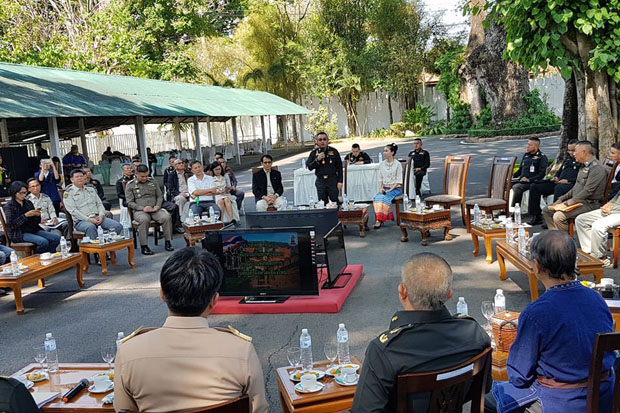
CHIANG MAI: Activists on Monday demanded the removal of houses built at the foot of forested Doi Suthep mountain for the Appeal Court, but the Office of the Judiciary later replied it would involve a breach of contract.
The demolition demand was made during a discussion on the controversial housing project for the region 5 office of the Appeal Court organised at the 33th Military Circle in this northern province.
The Appeal Court's regional office did not send a representative there as earlier promised. Other government agencies did.
Activist Krit Mekmethakorn told the discussion he would resume his walkathon from Chiang Mai to Bangkok to ask Prime Minister Prayut Chan-o-cha, as chief of the National Council for Peace and Order (NCPO), to invoke Section 44 of the interim charter to order the demolition of the housing and reforestation of the cleared area.
He had halted the journey in Lapang pending the outcome of the discussion.
Teerasak Roopsuwan, coordinator of a network for Doi Suthep reforestation, said Chiang Mai people were hurt. A large area of forest had been cleared and a stream was affected by the housing project.
Chiang Mai people had promised the state 30 years ago they would not fell any trees on Doi Suthep, because it was a place of spiritual importance to them, he said, referring to Wat Phra That Doi Suthep on top of the mountain.
The tracks of many kinds of wildlife, including rare leopard cats, had been found at what was now the housing estate site. About 16,000 trees were felled, he said.
Activist Panaros Buakhli said the contractor building the residences could finish the work before the demolition, so that the state would not have to make compensation for early termination of contract.
Chiang Mai regional treasury chief Yongyut Rueangpatarakul said the Treasury Department, which owns the land, gave land-use permission for the housing project on July 21, 2016.
Chatchai Naktipawan, a senior forestry official at the Chiang Mai office of the National Parks, Wildlife and Plant Conservation Department, said during the discussion that the project covered 147 rai in Mae Rim district, and 45 detached houses and nine condominium buildings were being built there, but the terrain was a 12-26 degree slope and therefore vulnerable to landslides.
Lt Gen Wijak Siribansop, commander of the 3rd Army, said he organised the discussion on behalf of the NCPO and he would submit a report to it on Tuesday.
Concerned parties would inspect the housing site on April 19. The activists who embarked on a protest walkathon to Bangkok should suspend it pending the inspection, he said.
The walkathon started last Wednesday, and the following day Deputy Prime Minister Prawit Wongsuwon said the construction work would be suspended and the new residences would be then completed for public use as a vacation area.
Sarawoot Benjakul, secretary-general of the Office of the Judiciary, said later on Monday that the office could not terminate the construction contract because the contractor would sue.
Besides, it could not order the buildings demolished because the law did not permit it to do so and the State Audit Office would investigate it, he said.
His office would not object to the government suspending the use of the residences, or taking any other action pending environmental rehabilitation of the site, he said.